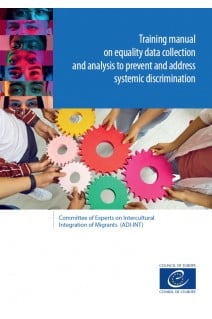Ensuring equality, valuing diversity, fostering meaningful interaction and facilitating active citizenship and participation
Systemic discrimination is not immediately visible and is rarely the result of specific intent. Yet, it drives entrenched disadvantage and inequality for many groups in society. As this is a complex phenomenon to identify, the collection and analysis of equality data are indispensable.
Resulting from the collaborative work of local, regional and national authorities, this training manual addresses the need to combat and prevent systemic discrimination by focusing on data collection and processing.
This training manual will assist stakeholders in acquiring the necessary skills to develop suitable structures and systems, at all levels of governance, to effectively address systemic discrimination and drive the change needed.
This manual specifically draws from the work on systemic discrimination undertaken by the Intercultural Cities (ICC) Programme of the Council of Europe.
Each module of the manual includes material on approaches to collecting and analysing equality data, alongside “food-forthought” exercises, quizzes, checklists and reference documents. It also features a glossary of key intercultural terms as an appendix.
INTRODUCTION
Starting points
Purpose and target audience
Content
MODULE 1 – EQUALITY DATA: PURPOSE AND PRINCIPLES
Systemic discrimination and equality data
Purpose of equality data collection and analysis
Values engaged in equality data collection and analysis
Multilevel governance
MODULE 2 – TARGETED EQUALITY DATA INITIATIVES
Developmental approach
Building a knowledge base
Engaging communities
MODULE 3 – AN EQUALITY DATA STRATEGY
Institutional approach
Developing an equality data strategy
FINISH
APPENDIX – INTERCULTURAL GLOSSARY
Other relevant definitions
BIBLIOGRAPHY
Council of Europe
European Union
United Nations
Other








